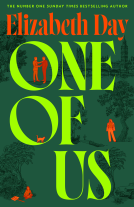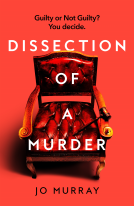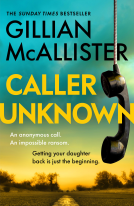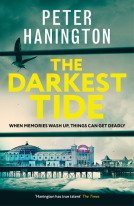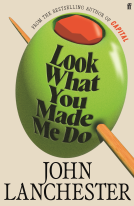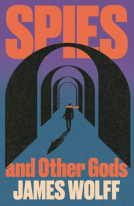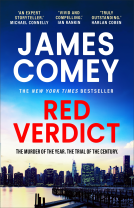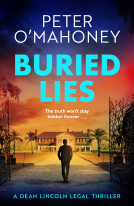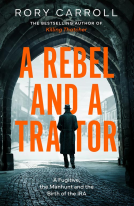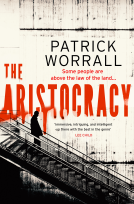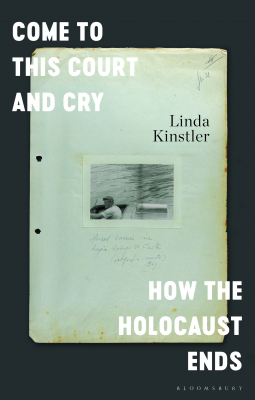
Come to This Court and Cry
How the Holocaust Ends
by Linda Kinstler
This title was previously available on NetGalley and is now archived.
Send NetGalley books directly to your Kindle or Kindle app
1
To read on a Kindle or Kindle app, please add kindle@netgalley.com as an approved email address to receive files in your Amazon account. Click here for step-by-step instructions.
2
Also find your Kindle email address within your Amazon account, and enter it here.
Pub Date 26 May 2022 | Archive Date 26 May 2022
Talking about this book? Use #CometoThisCourtandCry #NetGalley. More hashtag tips!
Description
'Part detective story, part family history, part probing inquiry into how best to reckon with the horrors of a previous century, Come to This Court and Cry is bracingly original, beautifully written and haunting. An astonishing book' Patrick Radden Keefe, author of Empire of Pain
-------------------------------------------------
To probe the past is to submit the memory of one's ancestors to a certain kind of trial.
In this case, the trial came to me.
A few years ago Linda Kinstler discovered that a man fifty years dead - a former Nazi who belonged to the same killing unit as her grandfather - was the subject of an ongoing criminal investigation in Latvia. The proceedings threatened to pardon his crimes. They put on the line hard-won facts about the Holocaust at the precise moment that the last living survivors - the last legal witnesses - were dying.
Across the world, Second World War-era cases are winding their way through the courts. Survivors have been telling their stories for the better part of a century, and still judges ask for proof. Where do these stories end? What responsibilities attend their transmission, so many generations on? How many ghosts need to be put on trial for us to consider the crime scene of history closed?
In this major non-fiction debut, Linda Kinstler investigates both her family story and the archives of ten nations to examine what it takes to prove history in our uncertain century. Probing and profound, Come to this Court and Cry is about the nature of memory and justice when revisionism, ultra-nationalism and denialism make it feel like history is slipping out from under our feet. It asks how the stories we tell about ourselves, our families and our nations are passed down, how we alter them, and what they demand of us.
Advance Praise
'A masterpiece' Peter Pomerantsev
'Kinstler reminds us of the dangerous instability of truth and testimony, and the urgent need, in the twenty-first century, to keep telling the history of the twentieth' Anne Applebaum
'Searching and powerful. Writers like Kinstler are needed now more than ever' Adam Kirsch
Available Editions
| EDITION | Hardcover |
| ISBN | 9781526612595 |
| PRICE | £20.00 (GBP) |
Average rating from 11 members
Featured Reviews
 Greville W, Reviewer
Greville W, Reviewer
It is difficult if not impossible to say that I "enjoyed" this book given its appalling and tragic subject matter but this was a brilliantly evocative and well executed and perhaps cathartic account of how Linda Kinstler's grandfather was involved in the Nazi death squads exterminating the Jews in Latvia.
I find it hard to read much about the Holocaust and antisemitism this is a worthy and well written addition to the genre.
This is a pressing engagement with how to think about not just the Holocaust but with its continuing legacies in the twenty-first century. The author's grandfather was a Nazi officer who operated in a killing squad with Herbert Cukurs: a man who was judged responsible for the murder of over 30,000 Jews and was himself executed in Uruguay by Mossad, even though he also saved at least one Jewish woman by taking her into his home.
Kinstler approaches this legacy through multiple directions: the personal in terms of coming to terms with her own family history. And the legal and political, thinking through why, for example, "survivors have been telling the story of the Holocaust for the better part of a century, and still the judges ask for proof.".
This isn't - and can't be - a neat book, and it's all the stronger for dealing with complexities and perplexities, as well as thinking about the moral implications of those big terms like 'justice', 'history', and 'memory'.
 Clare H, Educator
Clare H, Educator
A fascinating account of the Holocaust in Latvia and the role of the author's grandfather in a specific unit who carried out many executions of Jewish people by bullet.
A huge amount of research has gone into this book to make it a captivating read. I understand that the premise of it is to discover more about the author's grandfather but to me, his role is so unclear as so little is known about it that it just appears at various parts of the story to little consequence. The story feels ultimately about Cukurs, his assassination and the revisionist approach being taken in Latvia with regards to Cukurs.
Overall it is a well written and well researched book. I noticed that the author sometimes writes in the present tense with regards to past events and I found that irritating at times. Also, I think the addition of photos of Boris in his Nazi uniform and of Cukurs would be beneficial in further engaging the reader.
I really enjoyed this book, even more than I thought I would have based on the description. I actually think the description is missing a few details that would perhaps make this a bit more eye-catching; for example, although the author's paternal grandfather was a Latvian Nazi collaborator, her maternal side is Latvian Jewish and she was raised Jewish -- I think that this gives her an incredibly interesting and nuanced perspective, as well as the ability to really understand the 'shades of gray' that make up a person's character.
Additionally, I was a bit surprised that the description didn't mention that the "former Nazi who belonged to the same killing unit as her grandfather" was actually Herberts Cukurs -- this would have piqued my interest even more since his assassination and trial(s) were and are very high-profile. Even though I was familiar with the case, I still learned a lot from the author, whose own research and connections filled in a lot of details I haven't seen elsewhere. I also believe that her complicated family history gives her a really unique understanding of how someone can be both good and bad.
The author did an excellent job of explaining Latvia's desire to minimize its citizens' roles as Nazi collaborators in as balanced of a way as one could possibly do from a Western perspective. Without minimizing how absolutely terrifying it is that Latvia and other Baltic countries are trying to shirk responsibility for the Holocaust, I think that Kinstler did an admirable job of providing the right context around why this reshaping of history is so important to the relatively new nation's sense of autonomy and patriotism.
The only criticism I have is that the personal part of the plot (trying to better understand her grandfather's role as a collaborator) didn't always pull through the rest of the narrative, nor did it really progress throughout the book -- I feel like she could have done more to tie up that thread instead of focusing on the trial so much.
Many thanks to the publisher for the opportunity to read and review this advanced copy!
Part history, part investigative memoir, Come to this Court and Cry is an intelligent account of the Holocaust in Latvia as told through the lens of the law. Exploring the sensitive subject of historical revisionism through the ongoing case of Herberts Cukurs, Kinstler poses the question what if the antonym of 'forgetting' is not 'remembering', but justice?
It's a captivating, thought-provoking read, providing the reader with an insight not only into the historical facts of the Holocaust in Latvia, but also the importance of interpretation, and the way historical crimes are addressed by the law.
 Jane B, Bookseller
Jane B, Bookseller
I simply devoured this book. I found it compulsive and deeply disturbing. I love the way in which history can be written in such a personal and direct way. There are so very many books on the Holocaust and the horrors of the Second World War but this one will stand out in my mind for avery long time.
It feels wrong to say I enjoyed this book considering the topic of the Holocaust and the atrocities that were carried out, however it is a book I thoroughly enjoyed reading. It was interesting, considerate and obviously very well researched and held my attention very well.
It was sensitive to the subject and respectful towards the survivors and the people involved. A good edition to books on this subject.
